《英文小说与电影》课程教学资源 English Novels and Films(自编资料,石河子大学:吴方敏、陈晨)

EnglishNovels and Films英文小说与电影吴方敏陈晨 (编)-
1 English Novels and Films 英文小说与电影 吴方敏 陈晨(编)
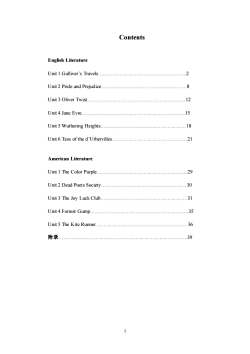
ContentsEnglish Literature.2Unit1Gulliver'sTravelsdUnit 2 Pride and Prejud ice12Unit3OliverTwist..15Unit4JaneEyre.18Unit 5 Wuthering Heights.Unit 6 Tess of the d'Urbervilles..21American Literature29Unit 1 The Color Purple..30Unit2DeadPoetsSocietyUnit 3 The Joy Luck Club....31..35Unit4ForrestGump36Unit5TheKiteRunner附录.392
2 Contents English Literature Unit 1 Gulliver’s Travels.2 Unit 2 Pride and Prejudice.8 Unit 3 Oliver Twist.12 Unit 4 Jane Eyre.15 Unit 5 Wuthering Heights.18 Unit 6 Tess of the d’Urbervilles.21 American Literature Unit 1 The Color Purple.29 Unit 2 Dead Poets Society.30 Unit 3 The Joy Luck Club.31 Unit 4 Forrest Gump.35 Unit 5 The Kite Runner .36 附录.39
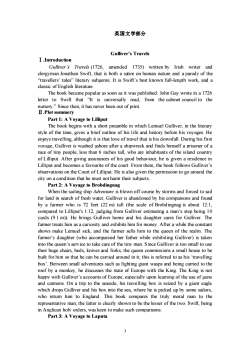
英国文学部分Gulliver's TravelsI.IntroductionGulliver'sTravels(1726,amended1735)writtenby Irishwriterandclergyman Jonathan Swift, that is both a satire on human nature and a parody of thetravellers' tales" literary subgenre. It is Swift's best known full-length work, and aclassicofEnglishliterature.The book became popular as soon as it was published. John Gay wrote in a 1726letterto Swift that It is universally read,from thecabinetcouncilto thenursery." Since then, it has never been out of print.I.PlotsummeryPart 1: A Voyage to LilliputThe book begins with a short preamble in which Lemuel Gulliver, in the literarystyle of the time, gives a brief outline of his life and history before his voyages. Heenjoys travelling, although it is that love of travel that is his downfall. During his firstvoyage, Gulliver is washed ashore after a shipwreck and finds himself a prisoner of arace of tiny people, less than 6 inches tall, who are inhabitants of the island countryof Lilliput. After giving assurances of his good behaviour, he is given a residence inLilliputand becomesafavouriteofthecourt.Fromthere,thebookfollowsGulliver'sobservations on the Court of Lilliput. He is also given the permission to go around thecity on a condition that he must not harm their subjects.Part2:AVoyagetoBrobdingnagWhen the sailing ship Adventure is blown off course by storms and forced to sailforland in search offreshwater,Gulliveris abandonedbyhis companionsandfoundby a farmer who is 72 feet (22 m) tall (the scale of Brobdingnag is about 12:1,compared to Lilliput's 1:12, judging from Gulliver estimating a man's step being 10yards (9.1m)).He brings Gulliverhome and his daughter caresfor Gulliver.Thefarmertreatshimasa curiosityand exhibitshimformoney.Aftera whiletheconstantshowsmakeLemuel sick, andthefarmer sellshimtothequeenof therealm.Thefarmer'sdaughter(who accompaniedherfather while exhibitingGulliver)istakeninto the queen's service to take care of the tinyman.Since Gulliver is too small tousetheirhuge chairs, beds,knives and forks, the queen commissions a small house to bebuilt for him so that he can be carried around in it; this is referred to as his travellingbox. Between small adventures such as fighting giant wasps and being carried to theroofbyamonkey.hediscussesthestateofEuropewiththeKing.TheKingisnothappywithGulliver's accountsof Europe,especiallyupon learning oftheuse of gunsand cannons. On a trip to the seaside, his travelling box is seized by a giant eaglewhichdrops Gulliverandhis boxintothe sea, wherehe is picked upby some sailors,who return him to England. This book compares the truly moral man to therepresentative man; the latter is clearly shown to be the lesser of the two. Swift, beinginAnglicanholyorders,waskeentomakesuchcomparisonsPart3:AVoyagetoLaputa3
3 英国文学部分 Gulliver’s Travels Ⅰ.Introduction Gulliver’s Travels (1726, amended 1735) written by Irish writer and clergyman Jonathan Swift, that is both a satire on human nature and a parody of the “travellers’ tales” literary subgenre. It is Swift’s best known full-length work, and a classic of English literature. The book became popular as soon as it was published. John Gay wrote in a 1726 letter to Swift that “It is universally read, from the cabinet council to the nursery.” Since then, it has never been out of print. Ⅱ.Plot summery Part 1: A Voyage to Lilliput The book begins with a short preamble in which Lemuel Gulliver, in the literary style of the time, gives a brief outline of his life and history before his voyages. He enjoys travelling, although it is that love of travel that is his downfall. During his first voyage, Gulliver is washed ashore after a shipwreck and finds himself a prisoner of a race of tiny people, less than 6 inches tall, who are inhabitants of the island country of Lilliput. After giving assurances of his good behaviour, he is given a residence in Lilliput and becomes a favourite of the court. From there, the book follows Gulliver’s observations on the Court of Lilliput. He is also given the permission to go around the city on a condition that he must not harm their subjects. Part 2: A Voyage to Brobdingnag When the sailing ship Adventure is blown off course by storms and forced to sail for land in search of fresh water, Gulliver is abandoned by his companions and found by a farmer who is 72 feet (22 m) tall (the scale of Brobdingnag is about 12:1, compared to Lilliput's 1:12, judging from Gulliver estimating a man’s step being 10 yards (9.1 m)). He brings Gulliver home and his daughter cares for Gulliver. The farmer treats him as a curiosity and exhibits him for money. After a while the constant shows make Lemuel sick, and the farmer sells him to the queen of the realm. The farmer’s daughter (who accompanied her father while exhibiting Gulliver) is taken into the queen’s service to take care of the tiny man. Since Gulliver is too small to use their huge chairs, beds, knives and forks, the queen commissions a small house to be built for him so that he can be carried around in it; this is referred to as his ‘travelling box’. Between small adventures such as fighting giant wasps and being carried to the roof by a monkey, he discusses the state of Europe with the King. The King is not happy with Gulliver’s accounts of Europe, especially upon learning of the use of guns and cannons. On a trip to the seaside, his travelling box is seized by a giant eagle which drops Gulliver and his box into the sea, where he is picked up by some sailors, who return him to England. This book compares the truly moral man to the representative man; the latter is clearly shown to be the lesser of the two. Swift, being in Anglican holy orders, was keen to make such comparisons. Part 3: A Voyage to Laputa
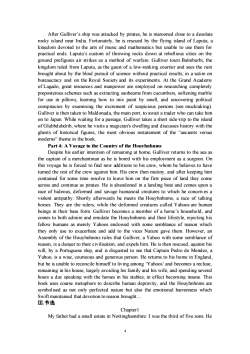
After Gulliver's ship was attacked by pirates, he is marooned close to a desolaterocky island near India. Fortunately, he is rescued by the flying island of Laputa, akingdomdevotedtotheartsofmusicandmathematicsbutunabletousethemforpractical ends. Laputa's custom of throwing rocks down at rebellious cities on theground prefigures air strikes as a method of warfare. Gulliver tours Balnibarbi, thekingdom ruled from Laputa, as the guest of a low-ranking courtier and sees the ruinbrought about by the blind pursuit of science without practical results, in a satire onbureaucracy and ontheRoyal Societyand itsexperiments.AttheGrand Academyof Lagado, great resources and manpower are employed on researching completelypreposterous schemes such as extracting sunbeams from cucumbers, softening marblefor use in pillows, learning how to mix paint by smell, and uncovering politicalconspiracies by examining the excrement of suspicious persons (see muckraking).Gulliver isthentakentoMaldonada.themainport.to awaitatraderwhocantakehimon to Japan. While waiting for a passage, Gulliver takes a short side-trip to the islandof Glubbdubdrib, where he visits a magician's dwelling and discusses history with theghosts of historical figures, the most obvious restatement of the “ancients versusmoderns"theme in the book.Part 4:AVoyage to the Country of the HouyhnhnmsDespitehisearlier intentionofremainingathome,Gulliverreturnstotheseaasthe captain of a merchantman as he is bored with his employment as a surgeon. Onthis voyageheisforced to find new additionstohis crew,whomhebelievesto haveturned therest of the crew against him.His crewthenmutiny,and afterkeepinghimcontained for some time resolve to leave him on the first piece of land they comeacross and continue as pirates.He is abandoned in a landing boat and comes upon arace of hideous. deformed and savage humanoid creatures to which he conceives aviolent antipathy. Shortly afterwards he meets the Houyhnhnms, a race of talkinghorses.They aretherulers,whilethedeformed creaturescalledYahoosarehumanbeings in their base form. Gulliver becomes a member of a horse's household,andcomestobothadmireandemulatetheHouyhnhnms andtheirlifestyle,rejectinghisfellowhumansasmerelyYahoosendowed withsomesemblanceof reasonwhichthey only use to exacerbate and add to the vices Nature gave them. However, anAssemblyof theHouyhnhnms rules that Gulliver,a Yahoo with some semblanceofreason, is a danger to their civilisation, and expels him.He is then rescued,against hiswill, by a Portuguese ship, and is disgusted to see that Captain Pedro de Mendez, aYahoo, is a wise, courteous and generous person. He returns to his home in Englandbut he is unable to reconcile himself to living among Yahoos'and becomes a recluse,remaining in his house, largely avoiding his family and his wife, and spending severalhours a day speaking with the horses in his stables, in effect becoming insane. Thisbookusescoarsemetaphorsto describehumandepravity,andtheHouyhnhnmsaresymbolised as not only perfected nature but also the emotional barrenness whichSwift maintained that devotion to reason brought...Ⅱ.节选ChapterlMyfatherhadasmall estateinNottinghamshire:Iwasthethirdoffivesons.He4
4 After Gulliver’s ship was attacked by pirates, he is marooned close to a desolate rocky island near India. Fortunately, he is rescued by the flying island of Laputa, a kingdom devoted to the arts of music and mathematics but unable to use them for practical ends. Laputa’s custom of throwing rocks down at rebellious cities on the ground prefigures air strikes as a method of warfare. Gulliver tours Balnibarbi, the kingdom ruled from Laputa, as the guest of a low-ranking courtier and sees the ruin brought about by the blind pursuit of science without practical results, in a satire on bureaucracy and on the Royal Society and its experiments. At the Grand Academy of Lagado, great resources and manpower are employed on researching completely preposterous schemes such as extracting sunbeams from cucumbers, softening marble for use in pillows, learning how to mix paint by smell, and uncovering political conspiracies by examining the excrement of suspicious persons (see muckraking). Gulliver is then taken to Maldonada, the main port, to await a trader who can take him on to Japan. While waiting for a passage, Gulliver takes a short side-trip to the island of Glubbdubdrib, where he visits a magician's dwelling and discusses history with the ghosts of historical figures, the most obvious restatement of the “ancients versus moderns” theme in the book. Part 4: A Voyage to the Country of the Houyhnhnms Despite his earlier intention of remaining at home, Gulliver returns to the sea as the captain of a merchantman as he is bored with his employment as a surgeon. On this voyage he is forced to find new additions to his crew, whom he believes to have turned the rest of the crew against him. His crew then mutiny, and after keeping him contained for some time resolve to leave him on the first piece of land they come across and continue as pirates. He is abandoned in a landing boat and comes upon a race of hideous, deformed and savage humanoid creatures to which he conceives a violent antipathy. Shortly afterwards he meets the Houyhnhnms, a race of talking horses. They are the rulers, while the deformed creatures called Yahoos are human beings in their base form. Gulliver becomes a member of a horse’s household, and comes to both admire and emulate the Houyhnhnms and their lifestyle, rejecting his fellow humans as merely Yahoos endowed with some semblance of reason which they only use to exacerbate and add to the vices Nature gave them. However, an Assembly of the Houyhnhnms rules that Gulliver, a Yahoo with some semblance of reason, is a danger to their civilisation, and expels him. He is then rescued, against his will, by a Portuguese ship, and is disgusted to see that Captain Pedro de Mendez, a Yahoo, is a wise, courteous and generous person. He returns to his home in England, but he is unable to reconcile himself to living among ‘Yahoos’ and becomes a recluse, remaining in his house, largely avoiding his family and his wife, and spending several hours a day speaking with the horses in his stables; in effect becoming insane. This book uses coarse metaphors to describe human depravity, and the Houyhnhnms are symbolised as not only perfected nature but also the emotional barrenness which Swift maintained that devotion to reason brought. Ⅲ.节选 Chapter1 My father had a small estate in Nottinghamshire: I was the third of five sons. He
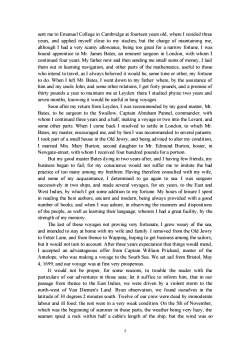
sent me to Emanuel College in Cambridge at fourteen years old, where I resided threeyears, and applied myself close to my studies; but the charge of maintaining me,althoughIhad avery scanty allowance,beingtoogreatforanarrowfortune,Iwasbound apprentice to Mr. James Bates, an eminent surgeon in London, with whom Icontinuedfouryears.Myfathernowandthensendingmesmall sumsofmoney,I laidthem out in learning navigation, and other parts of the mathematics, useful to thosewho intend totravel, asI always believed it would be, some time or other, my fortuneto do. When I left Mr.Bates, I went down to my father:where, by the assistance ofhim and my uncle John, and some other relations, I got forty pounds, and a promise ofthirty pounds a year to maintain me at Leyden: there I studied physic two years andseven months, knowing it would be useful in long voyages.Soon after my return from Leyden,I was recommended by my good master, Mr.Bates, to be surgeon to the Swallow, Captain Abraham Pannel, commander, withwhom I continued three years and a half, making a voyage or two into the Levant, andsome other parts.When I comebackIresolved to settle inLondon,to which Mr.Bates,mymaster,encouragedme,and byhimIwasrecommendedto several patients.I took part of a small house in the Old Jewry; and being advised to alter my condition.I married Mrs. Mary Burton, second daughter to Mr. Edmund Burton, hosier, inNewgate-street, with whom I received four hundred pounds fora portion.But my good master Bates dying in two years after, and I having few friends, mybusinessbegantofail,formy consciencewould notsuffermetoimitatethebadpractice of too many among my brethren.Having therefore consulted with my wife,and some of my acquaintance, I determined to go again to sea. I was surgeonsuccessively in two ships, and made several voyages, for six years, to the East andWest Indies, by which I got some addition to my fortune. My hours of leisure I spentin reading the best authors, ancient and modern,being always provided withagoodnumber of books; and when I was ashore, in observing the manners and dispositionsof the people, as well as learning their language; wherein I had a great facility, by thestrength of my memory.The last of these voyages not proving very fortunate, I grew weary of the sea,and intended to stay at homewith my wife and family.I removed from the Old Jewryto Fetter Lane, and from thence to Wapping, hoping to get business among the sailors;but it would not tun to account. After three years expectation that things would mend,I accepted anadvantageous offerfrom CaptainWilliamPrichard,master of theAntelope, who was making a voyage to the South Sea. We set sail from Bristol, May4, 1699, and our voyage was at first very prosperous.It would not be proper, for some reasons, to trouble the reader with theparticulars of our adventures in those seas; let it suffice to inform him, that in ourpassagefrom thenceto the East Indies,we were driven by a violent storm tothenorth-west of VanDiemen's Land.Byan observation,wefound ourselves in thelatitude of 30 degrees 2 minutes south. Twelve of our crew were dead by immoderatelabour and ill food;the rest were ina very weak condition.On theSth of November,whichwasthebeginningof summerinthoseparts,theweatherbeingveryhazy,theseamen spied a rock within half a cable's length of the ship; but the wind was soS
5 sent me to Emanuel College in Cambridge at fourteen years old, where I resided three years, and applied myself close to my studies; but the charge of maintaining me, although I had a very scanty allowance, being too great for a narrow fortune, I was bound apprentice to Mr. James Bates, an eminent surgeon in London, with whom I continued four years. My father now and then sending me small sums of money, I laid them out in learning navigation, and other parts of the mathematics, useful to those who intend to travel, as I always believed it would be, some time or other, my fortune to do. When I left Mr. Bates, I went down to my father: where, by the assistance of him and my uncle John, and some other relations, I got forty pounds, and a promise of thirty pounds a year to maintain me at Leyden: there I studied physic two years and seven months, knowing it would be useful in long voyages. Soon after my return from Leyden, I was recommended by my good master, Mr. Bates, to be surgeon to the Swallow, Captain Abraham Pannel, commander; with whom I continued three years and a half, making a voyage or two into the Levant, and some other parts. When I come back I resolved to settle in London; to which Mr. Bates, my master, encouraged me, and by him I was recommended to several patients. I took part of a small house in the Old Jewry; and being advised to alter my condition, I married Mrs. Mary Burton, second daughter to Mr. Edmund Burton, hosier, in Newgate-street, with whom I received four hundred pounds for a portion. But my good master Bates dying in two years after, and I having few friends, my business began to fail; for my conscience would not suffer me to imitate the bad practice of too many among my brethren. Having therefore consulted with my wife, and some of my acquaintance, I determined to go again to sea. I was surgeon successively in two ships, and made several voyages, for six years, to the East and West Indies, by which I got some addition to my fortune. My hours of leisure I spent in reading the best authors, ancient and modern, being always provided with a good number of books; and when I was ashore, in observing the manners and dispositions of the people, as well as learning their language; wherein I had a great facility, by the strength of my memory. The last of these voyages not proving very fortunate, I grew weary of the sea, and intended to stay at home with my wife and family. I removed from the Old Jewry to Fetter Lane, and from thence to Wapping, hoping to get business among the sailors; but it would not turn to account. After three years expectation that things would mend, I accepted an advantageous offer from Captain William Prichard, master of the Antelope, who was making a voyage to the South Sea. We set sail from Bristol, May 4, 1699, and our voyage was at first very prosperous. It would not be proper, for some reasons, to trouble the reader with the particulars of our adventures in those seas; let it suffice to inform him, that in our passage from thence to the East Indies, we were driven by a violent storm to the north-west of Van Diemen's Land. Byan observation, we found ourselves in the latitude of 30 degrees 2 minutes south. Twelve of our crew were dead by immoderate labour and ill food; the rest were in a very weak condition. On the 5th of November, which was the beginning of summer in those parts, the weather being very hazy, the seamen spied a rock within half a cable's length of the ship; but the wind was so
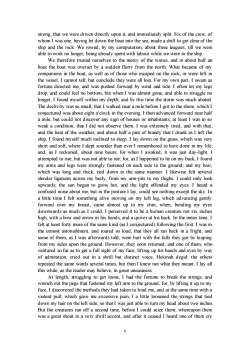
strong, that we were driven directly upon it, and immediately split. Six of the crew, ofwhomIwasone,havingletdowntheboatintothesea,madeashifttogetclearof theship and the rock.We rowed, by my computation, about three leagues, till we wereabletoworknolonger,beingalreadyspentwithlabourwhilewewereintheship.We therefore trusted ourselves to the mercy of the waves, and in about half anhour the boat was overset by a sudden flurry from the north.What became of mycompanions in the boat, as well as of those who escaped on the rock, or were left inthe vessel, I cannot tell; but conclude they were all lost.For my own part,I swam asfortune directed me, and was pushed forward by wind and tide. I often let my legsdrop, and could feel no bottom; but whenI was almost gone,and able to struggle nolonger,Ifoundmyselfwithinmydepth,andbythistimethestormwasmuchabatedThedeclivitywas sosmall, that I walked neara milebeforeI gottothe shore,which Iconjectured was about eight o'clock in the evening.I then advanced forward near halfa mile, but could not discover any sign of houses or inhabitants, at least I was in soweak a condition, that I did not observe them. I was extremely tired, and with that,and the heat of the weather, and about half a pint of brandy that I drank as I left theship, I found myself much inclined to sleep. I lay down on the grass, which was veryshortand soft,whereI sleptsounderthaneverI rememberedtohavedoneinmylife,and, as I reckoned, about nine hours, for when I awaked, it was just day-light. Iattempted to rise,but was not ableto stir:for,asI happened to lieonmyback,I foundmyarmsandlegswerestronglyfastenedoneachsidetotheground,andmyhairwhich was long and thick, tied down in the same manner. I likewise felt severalslender ligatures across my body, from my arm-pits to my thighs. I could only lookupwards; the sun began to grow hot, and the light offended my eyes. I heard aconfused noise about me; but in the posture I lay, could see nothing except the sky. Ina little time I felt something alive moving on my left leg, which advancing gentlyforward over my breast,came almost up to my chin;when,bending my eyesdownwards as much as I could, I perceived it to be a human creature not six incheshigh,withabow and arrow inhishands,and aquiverat hisback.Inthemean time,Ifeltat leastfortymoreof thesamekind (asIconjectured)followingthefirst.I was inthe utmost astonishment, and roared so loud, that they all ran back in a fright, andsome of them, as I was afterwards told, were hurt with the falls they got by leapingfrommy sides upontheground.However,they soonreturned,and oneof them,whoventured so far as to get a full sight of my face, lifting up his hands and eyes by wayof admiration. cried out in a shrill but distinct voice. Hekinah degul: the othersrepeated the same words several times, but then I knew not what they meant. I lay allthiswhile,asthereadermaybelieve.ingreatuneasiness.At length, struggling to get loose, I had the fortune to break the strings, andwrench out the pegs that fastened my left arm to the ground; for, by lifting it up to myface,I discovered the methods they had taken to bind me, and at the same time with aviolent pull, which gave me excessive pain, I a little loosened the strings that tieddown my hair on the left side, so that I was just able to turn my head about two inches.Butthecreaturesranoffa secondtime,beforeIcouldseizethem,whereupontherewas a great shout in a very shrill accent, and after it ceased I heard one of them cry
6 strong, that we were driven directly upon it, and immediately split. Six of the crew, of whom I was one, having let down the boat into the sea, made a shift to get clear of the ship and the rock. We rowed, by my computation, about three leagues, till we were able to work no longer, being already spent with labour while we were in the ship. We therefore trusted ourselves to the mercy of the waves, and in about half an hour the boat was overset by a sudden flurry from the north. What became of my companions in the boat, as well as of those who escaped on the rock, or were left in the vessel, I cannot tell; but conclude they were all lost. For my own part, I swam as fortune directed me, and was pushed forward by wind and tide. I often let my legs drop, and could feel no bottom; but when I was almost gone, and able to struggle no longer, I found myself within my depth; and by this time the storm was much abated. The declivity was so small, that I walked near a mile before I got to the shore, which I conjectured was about eight o'clock in the evening. I then advanced forward near half a mile, but could not discover any sign of houses or inhabitants; at least I was in so weak a condition, that I did not observe them. I was extremely tired, and with that, and the heat of the weather, and about half a pint of brandy that I drank as I left the ship, I found myself much inclined to sleep. I lay down on the grass, which was very short and soft, where I slept sounder than ever I remembered to have done in my life, and, as I reckoned, about nine hours; for when I awaked, it was just day-light. I attempted to rise, but was not able to stir: for, as I happened to lie on my back, I found my arms and legs were strongly fastened on each side to the ground; and my hair, which was long and thick, tied down in the same manner. I likewise felt several slender ligatures across my body, from my arm-pits to my thighs. I could only look upwards; the sun began to grow hot, and the light offended my eyes. I heard a confused noise about me; but in the posture I lay, could see nothing except the sky. In a little time I felt something alive moving on my left leg, which advancing gently forward over my breast, came almost up to my chin; when, bending my eyes downwards as much as I could, I perceived it to be a human creature not six inches high, with a bow and arrow in his hands, and a quiver at his back. In the mean time, I felt at least forty more of the same kind (as I conjectured) following the first. I was in the utmost astonishment, and roared so loud, that they all ran back in a fright; and some of them, as I was afterwards told, were hurt with the falls they got by leaping from my sides upon the ground. However, they soon returned, and one of them, who ventured so far as to get a full sight of my face, lifting up his hands and eyes by way of admiration, cried out in a shrill but distinct voice, Hekinah degul: the others repeated the same words several times, but then I knew not what they meant. I lay all this while, as the reader may believe, in great uneasiness. At length, struggling to get loose, I had the fortune to break the strings, and wrench out the pegs that fastened my left arm to the ground; for, by lifting it up to my face, I discovered the methods they had taken to bind me, and at the same time with a violent pull, which gave me excessive pain, I a little loosened the strings that tied down my hair on the left side, so that I was just able to turn my head about two inches. But the creatures ran off a second time, before I could seize them; whereupon there was a great shout in a very shrill accent, and after it ceased I heard one of them cry
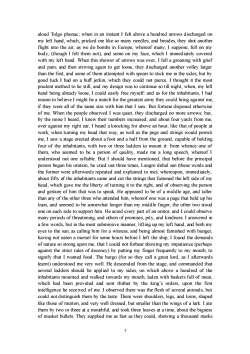
aloud Tolgo phonac; when in an instant I felt above a hundred arrows discharged onmy left hand, which, pricked me like so many needles, and besides,they shot anotherflight into the air, as we do bombs in Europe, whereof many, I suppose, fell on mybody,(thoughIfeltthemnot),and someonmyface,whichIimmediatelycoveredwith my left hand.When this shower of arrows was over, I fell a groaning with griefand pain; and then striving again to get loose, they discharged another volley largerthan thefirst, and some of them attempted with spearsto stick me in the sides, but bygood luck I had on a buff jerkin, which they could not pierce. I thought it the mostprudent method to lie still, and my design was to continue so till night, when, my lefthand being already loose,I could easilyfreemyself:and asfor the inhabitants,IhadreasontobelieveImightbeamatchforthegreatestarmytheycouldbringagainstmeif theywereall ofthesamesizewithhimthatI saw.Butfortunedisposed otherwiseof me.Whenthepeopleobserved I wasquiet,theydischarged nomorearrows,but,by the noise I heard, I knew their numbers increased; and about four yards from me,over against my right ear, I heard a knocking for above an hour, like that of people atwork, when turning my head that way, as well as the pegs and strings would permitme, I saw a stage erected about a foot and a half from the ground, capable of holdingfouroftheinhabitants,withtwoorthreeladderstomountit:fromwhenceoneofthem, who seemed to be a person of quality, made me a long speech, whereof Iunderstood not one syllable.But I should havementioned,that beforetheprincipalperson began his oration, he cried out three times, Langro dehul san (these words andtheformerwereafterwardsrepeatedand explainedtome),whereupon,immediately,about fifty of the inhabitants came and cut the strings that fastened the left side of myhead, which gave me the liberty of turning it to the right, and of observing the personand gesture of him that was to speak. He appeared to be of a middle age, and tallerthan anyof theotherthreewhoattended him,whereof onewasapagethat held uphistrain, and seemed to be somewhat longer than my middle finger, the other two stoodone oneach side to support him.Heacted every part of an orator,and Icould observemanyperiodsofthreatening,andothersofpromises,pity,andkindness.Iansweredina few words, but in the most submissive manner, lifting up my left hand, and both myeyes to the sun, as calling him for a witness; and being almost famished with hunger,having not eaten a morsel for somehours beforeI left the ship,I found the demandsofnature so stronguponme,thatI couldnotforbearshowingmy impatience(perhapsagainst the strict rules of decency) by putting my finger frequently to my mouth, tosignify that I wanted food. The hurgo (for so they call a great lord, as I afterwardslearnt) understood me very well. He descended from the stage, and commanded thatseveral ladders should be applied to my sides,onwhich above a hundred of theinhabitants mounted and walked towards my mouth, laden with baskets full of meat,which had been provided and sent thither by the king's orders,upon the firstintelligencehe received of me.I observed there was theflesh of several animals,butcould not distinguish them by the taste. There were shoulders, legs, and loins, shapedlike those of mutton, and very well dressed, but smaller than the wings of a lark. I atethembytwoorthreeatamouthful,andtookthreeloavesatatime,aboutthebignessof musket bullets. They supplied me as fast as they could, showing a thousand marks7
7 aloud Tolgo phonac; when in an instant I felt above a hundred arrows discharged on my left hand, which, pricked me like so many needles; and besides, they shot another flight into the air, as we do bombs in Europe, whereof many, I suppose, fell on my body, (though I felt them not), and some on my face, which I immediately covered with my left hand. When this shower of arrows was over, I fell a groaning with grief and pain; and then striving again to get loose, they discharged another volley larger than the first, and some of them attempted with spears to stick me in the sides; but by good luck I had on a buff jerkin, which they could not pierce. I thought it the most prudent method to lie still, and my design was to continue so till night, when, my left hand being already loose, I could easily free myself: and as for the inhabitants, I had reason to believe I might be a match for the greatest army they could bring against me, if they were all of the same size with him that I saw. But fortune disposed otherwise of me. When the people observed I was quiet, they discharged no more arrows; but, by the noise I heard, I knew their numbers increased; and about four yards from me, over against my right ear, I heard a knocking for above an hour, like that of people at work; when turning my head that way, as well as the pegs and strings would permit me, I saw a stage erected about a foot and a half from the ground, capable of holding four of the inhabitants, with two or three ladders to mount it: from whence one of them, who seemed to be a person of quality, made me a long speech, whereof I understood not one syllable. But I should have mentioned, that before the principal person began his oration, he cried out three times, Langro dehul san (these words and the former were afterwards repeated and explained to me); whereupon, immediately, about fifty of the inhabitants came and cut the strings that fastened the left side of my head, which gave me the liberty of turning it to the right, and of observing the person and gesture of him that was to speak. He appeared to be of a middle age, and taller than any of the other three who attended him, whereof one was a page that held up his train, and seemed to be somewhat longer than my middle finger; the other two stood one on each side to support him. He acted every part of an orator, and I could observe many periods of threatening, and others of promises, pity, and kindness. I answered in a few words, but in the most submissive manner, lifting up my left hand, and both my eyes to the sun, as calling him for a witness; and being almost famished with hunger, having not eaten a morsel for some hours before I left the ship, I found the demands of nature so strong upon me, that I could not forbear showing my impatience (perhaps against the strict rules of decency) by putting my finger frequently to my mouth, to signify that I wanted food. The hurgo (for so they call a great lord, as I afterwards learnt) understood me very well. He descended from the stage, and commanded that several ladders should be applied to my sides, on which above a hundred of the inhabitants mounted and walked towards my mouth, laden with baskets full of meat, which had been provided and sent thither by the king’s orders, upon the first intelligence he received of me. I observed there was the flesh of several animals, but could not distinguish them by the taste. There were shoulders, legs, and loins, shaped like those of mutton, and very well dressed, but smaller than the wings of a lark. I ate them by two or three at a mouthful, and took three loaves at a time, about the bigness of musket bullets. They supplied me as fast as they could, showing a thousand marks
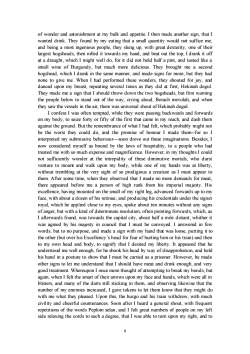
of wonder and astonishment at my bulk and appetite. I then made another sign, that Iwanted drink. They found by my eating that a small quantity would not suffice me;andbeingamostingeniouspeople,theyslungup,withgreatdexterity,oneoftheirlargest hogsheads.then rolled it towards my hand. and beat out the top:I drank it offat a draught, which I might well do, for it did not hold half a pint, and tasted like asmall wine of Burgundy,but much more delicious.They brought me a secondhogshead, which I drank in the same manner, and made signs for more, but they hadnone to give me. WhenI had performed these wonders,they shouted for joy,anddanced upon my breast, repeating several times as they did at first, Hekinah degulThey made me a sign that I should throw down the two hogsheads, but first warningthepeoplebelowtostandoutoftheway,cryingaloud,Borachmevolah,andwhentheysawthevessels intheair,therewasuniversal shoutofHekinahdegul.IconfessIwasoftentempted,whiletheywerepassingbackwardsandforwardson my body, to seize forty or fifty of the first that came in my reach, and dash themagainst the ground.But the remembrance of what I had felt,which probably might notbe the worst they could do, and the promise of honour I made them--for so Iinterpretedmysubmissivebehaviour--soondroveouttheseimaginations.Besides.Inow considered myself as bound by the laws of hospitality, to a people who hadtreatedmewithsomuchexpenseandmagnificence.However,inmythoughtsIcouldnot sufficiently wonder at the intrepidity ofthesediminutivemortals,who durstventureto mount and walk upon mybody,whileone of my hands was at liberty,without trembling at the very sight of so prodigious a creature as I must appear tothem. After some time, when they observed that I made no more demands for meat,there appeared before me a person of high rank from his imperial majesty.Hisexcellence, having mounted on the small of my right leg, advanced forwards up to myface, with about a dozen of his retinue: and producing his credentials under the signetroyal, which he applied close to my eyes, spoke about ten minutes without any signsof anger, but with akind of determinate resolution,often pointingforwards,which,asI afterwardsfound,wastowards the capital city,about half amiledistant,whither itwas agreed by his majesty in council that I must be conveyed. I answered in fewwords, but to no purpose, and made a sign with my hand that was loose, putting it totheother(but overhisExcellency'shead forfear of hurtinghimorhistrain)andthento my own head and body,to signify that I desired my liberty. It appeared that heunderstood mewell enough,forheshookhishead by wayof disapprobation,and heldhis hand in a posture to show that I must be carried as a prisoner.However, hemadeother signs to let me understand that I should have meat and drink enough, and verygood treatment. Whereupon I once more thought of attempting to break my bonds, butagain, whenI felt the smart of their arrows upon my face and hands,which wereall inblisters,and many of thedarts still sticking inthem,and observing likewisethatthenumber of my enemies increased,Igavetokensto let themknowthatthey might dowith me what they pleased. Upon this, the hurgo and his train withdrew, with muchcivility and cheerful countenances. Soon afterI heard a general shout, with frequentrepetitionsofthewordsPeplomselan,andIfeltgreatnumbersofpeopleonmylefiside relaxing the cords to such a degree, that I was able to turn upon my right, and to8
8 of wonder and astonishment at my bulk and appetite. I then made another sign, that I wanted drink. They found by my eating that a small quantity would not suffice me; and being a most ingenious people, they slung up, with great dexterity, one of their largest hogsheads, then rolled it towards my hand, and beat out the top; I drank it off at a draught, which I might well do, for it did not hold half a pint, and tasted like a small wine of Burgundy, but much more delicious. They brought me a second hogshead, which I drank in the same manner, and made signs for more; but they had none to give me. When I had performed these wonders, they shouted for joy, and danced upon my breast, repeating several times as they did at first, Hekinah degul. They made me a sign that I should throw down the two hogsheads, but first warning the people below to stand out of the way, crying aloud, Borach mevolah; and when they saw the vessels in the air, there was universal shout of Hekinah degul. I confess I was often tempted, while they were passing backwards and forwards on my body, to seize forty or fifty of the first that came in my reach, and dash them against the ground. But the remembrance of what I had felt, which probably might not be the worst they could do, and the promise of honour I made them-for so I interpreted my submissive behaviour—soon drove out these imaginations. Besides, I now considered myself as bound by the laws of hospitality, to a people who had treated me with so much expense and magnificence. However, in my thoughts I could not sufficiently wonder at the intrepidity of these diminutive mortals, who durst venture to mount and walk upon my body, while one of my hands was at liberty, without trembling at the very sight of so prodigious a creature as I must appear to them. After some time, when they observed that I made no more demands for meat, there appeared before me a person of high rank from his imperial majesty. His excellence, having mounted on the small of my right leg, advanced forwards up to my face, with about a dozen of his retinue; and producing his credentials under the signet royal, which he applied close to my eyes, spoke about ten minutes without any signs of anger, but with a kind of determinate resolution, often pointing forwards, which, as I afterwards found, was towards the capital city, about half a mile distant; whither it was agreed by his majesty in council that I must be conveyed. I answered in few words, but to no purpose, and made a sign with my hand that was loose, putting it to the other (but over his Excellency’s head for fear of hurting him or his train) and then to my own head and body, to signify that I desired my liberty. It appeared that he understood me well enough, for he shook his head by way of disapprobation, and held his hand in a posture to show that I must be carried as a prisoner. However, he made other signs to let me understand that I should have meat and drink enough, and very good treatment. Whereupon I once more thought of attempting to break my bonds; but again, when I felt the smart of their arrows upon my face and hands, which were all in blisters, and many of the darts still sticking in them, and observing likewise that the number of my enemies increased, I gave tokens to let them know that they might do with me what they pleased. Upon this, the hurgo and his train withdrew, with much civility and cheerful countenances. Soon after I heard a general shout, with frequent repetitions of the words Peplom selan; and I felt great numbers of people on my left side relaxing the cords to such a degree, that I was able to turn upon my right, and to
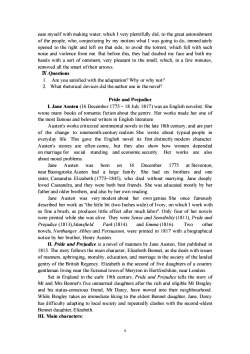
ease myself with making water: which I very plentifully did, to the great astonishmentof the people, who, conjecturing by my motion what I was going to do, immed iatelyopened to the right and left on that side, to avoid the torrent, which fell with suchnoise and violence from me.But before this, they had daubed my face and both myhands with a sort of ointment, very pleasant to the smell, which, in a few minutes,removedallthesmartoftheirarrows.IV.Questions1.Are you satisfied with the adaptation? Why or why not?2.What rhetorical devices did the author use in the novel?Pride and PrejudiceI. Jane Austen (16 December 1775-18 July 1817) was an English novelist. Shewrotemany books of romanticfiction aboutthegentry.Herworksmade her one ofthemost famous and beloved writers in English literature.Austen'sworks criticized sentimental novelsinthelate18thcenturyand arepartof the change to nineteenth-centuryrealism.She wrote about typical people ineveryday life. This gave the English novel its first distinctly modern character.Austen's stories are often comic,but they also show how women dependedonmarriagefor social standing andeconomic security.Herworks are alsoabout moral problems.161775JanebornDecemberAustenwasonatSteventon,near Basingstoke.Austen had a large family. She had six brothers and onesister, Cassandra Elizabeth (1773-1845), who died without marrying. Jane deeplyloved Cassandra, and they were both best friends. She was educated mostly by herfather and older brothers, and also by her own reading.JaneAusten was verymodestaboutherowngenius.Sheonce famouslydescribed her work as "the little bit (two Inches wide) of Ivory, on which I work withso fine a brush, as produces little effect after much labor. Only four of her novelswereprintedwhileshewasalive.TheywereSenseand Sensibility(1811),PrideandPrejudice(1813),MansfieldPark(1814)andEmma(1816).Twoothernovels, Northanger Abbey and Persuasion, were printed in 1817 with a biographicalnoticebyherbrother,HenryAusten.II. Pride and Prejudice is a novel of manners by Jane Austen, first published in1813. The story follows the main character, Elizabeth Bennet, as she deals with issuesof manners, upbringing, morality, education, and marriage in the society of the landedgentry of the British Regency.Elizabeth is the second of five daughters of a countrygentleman living near thefictional townof Meryton in Hertfordshire,near LondonSet in England in the early 19th century, Pride and Prejudice tells the story ofMrandMrsBennet'sfiveunmarried daughtersaftertherichand eligibleMrBingleyand his status-conscious friend,Mr Darcy,have moved into their neighbourhoodWhile Bingley takes an immediate liking to the eldest Bennet daughter, Jane, Darcyhasdifficulty adapting to local society and repeatedly clashes with the second-eldestBennet daughter, Elizabeth.Ill. Main characters:9
9 ease myself with making water; which I very plentifully did, to the great astonishment of the people; who, conjecturing by my motion what I was going to do, immediately opened to the right and left on that side, to avoid the torrent, which fell with such noise and violence from me. But before this, they had daubed my face and both my hands with a sort of ointment, very pleasant to the smell, which, in a few minutes, removed all the smart of their arrows. Ⅳ.Questions 1. Are you satisfied with the adaptation? Why or why not? 2. What rhetorical devices did the author use in the novel? Pride and Prejudice I. Jane Austen (16 December 1775 – 18 July 1817) was an English novelist. She wrote many books of romantic fiction about the gentry. Her works made her one of the most famous and beloved writers in English literature. Austen's works criticized sentimental novels in the late 18th century, and are part of the change to nineteenth-century realism. She wrote about typical people in everyday life. This gave the English novel its first distinctly modern character. Austen's stories are often comic, but they also show how women depended on marriage for social standing and economic security. Her works are also about moral problems. Jane Austen was born on 16 December 1775 at Steventon, near Basingstoke.Austen had a large family. She had six brothers and one sister, Cassandra Elizabeth (1773–1845), who died without marrying. Jane deeply loved Cassandra, and they were both best friends. She was educated mostly by her father and older brothers, and also by her own reading. Jane Austen was very modest about her own genius. She once famously described her work as "the little bit (two Inches wide) of Ivory, on which I work with so fine a brush, as produces little effect after much labor". Only four of her novels were printed while she was alive. They were Sense and Sensibility (1811), Pride and Prejudice (1813),Mansfield Park (1814) and Emma (1816). Two other novels, Northanger Abbey and Persuasion, were printed in 1817 with a biographical notice by her brother, Henry Austen. II. Pride and Prejudice is a novel of manners by Jane Austen, first published in 1813. The story follows the main character, Elizabeth Bennet, as she deals with issues of manners, upbringing, morality, education, and marriage in the society of the landed gentry of the British Regency. Elizabeth is the second of five daughters of a country gentleman living near the fictional town of Meryton in Hertfordshire, near London. Set in England in the early 19th century, Pride and Prejudice tells the story of Mr and Mrs Bennet's five unmarried daughters after the rich and eligible Mr Bingley and his status-conscious friend, Mr Darcy, have moved into their neighbourhood. While Bingley takes an immediate liking to the eldest Bennet daughter, Jane, Darcy has difficulty adapting to local society and repeatedly clashes with the second -eldest Bennet daughter, Elizabeth. III. Main characters:
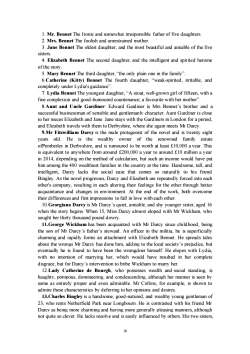
1. Mr. Bennet The Ironic and somewhat irresponsible father of five daughters.2.Mrs.Bennet The foolish and unrestrained mother.3.Jane Bennet The oldest daughter, and the most beautiful and amiable of the fivesisters.4.Elizabeth Bennet The second daughter, and the intelligent and spirited heroineofthestory5. Mary Bennet The third daughter, “the only plain one in the family"6.Catherine(Kitty) Bennet The fourth daughter,weak-spirited,irritable, andcompletely under Lydia's guidance7. Lydia Bennet The youngest daughter, “A stout, well-grown girl of fifteen, with afinecomplexionandgood-humouredcountenance,afavouritewithhermother8.Auntand UncleGardiner:Edward Gardiner is Mrs Bennet's brother and asuccessful businessmanof sensibleandgentlemanlycharacter.Aunt Gardineris closeto her nieces Elizabeth and Jane. Jane stays with the Gardiners in London for a period,and Elizabeth travels with them to Derbyshire, where she again meets Mr Darcy.9.Mr Fitzwilliam Darcy is the male protagonist of the novel and is twenty eightyears old. He is the wealthy owner of the renowned family estateofPemberleyinDerbyshire,andisrumouredtobeworthatleastf10,oooayear.Thisisequivalenttoanywherefromaroundf200.o00ayeartoaroundf10millionayearin2o14,dependingonthemethod of calculation,butsuchanincomewouldhaveputhimamongthe4o0wealthiestfamiliesinthecountryatthetime.Handsome,tall,andintelligent,Darcy lacks the social ease that comes so naturallyto hisfriendBingley. As the novel progresses, Darcy and Elizabeth are repeatedly forced into eachother's company, resulting in each altering their feelings for the other through betteracquaintance and changes in environment. At the end of the work. both overcometheirdifferences and first impressions tofall inlove witheachother.10.Georgiana Darcy is Mr Darcy's quiet, amiable,and shy younger sister, aged 16when the story begins.When 15, Miss Darcy almost eloped with Mr Wickham, whosoughtherthirtythousandpounddowry11.George Wickham has been acquainted with Mr Darcy since childhood, beingthe son of Mr Darcy's father's steward. An officer in the militia, he is superficiallycharming and rapidlyforms an attachment with Elizabeth Bennet.Hespreads talesabout the wrongs MrDarcy has donehim, addingtothelocal society's prejudice,buteventuallyhe isfound to havebeen thewrongdoerhimself.Heelopes withLydiawith no intention of marrying her, which would have resulted in her completedisgrace,butforDarcy'sinterventiontobribeWickhamtomarryher.12.Lady Catherine de Bourgh,who possesseswealth and social standing,ishaughty,pompous,domineering,and condescending,althoughhermanner is seenbysome as entirely proper and even admirable, Mr Collins, for example, is shown toadmirethese characteristics bydeferringtoheropinions anddesires.13.Charles Bingley is a hand some, good-natured, and wealthy young gentleman of23, who rents Netherfield Park near Longbourn. He is contrasted with his friend MrDarcyasbeingmorecharmingandhavingmoregenerallypleasingmanners,althoughnot quite so clever. He lacks resolve and is easily influenced by others. His two sisters,10
10 1. Mr. Bennet The Ironic and somewhat irresponsible father of five daughters. 2. Mrs. Bennet The foolish and unrestrained mother. 3. Jane Bennet The oldest daughter, and the most beautiful and amiable of the five sisters. 4. Elizabeth Bennet The second daughter, and the intelligent and spirited heroine of the story. 5. Mary Bennet The third daughter, “the only plain one in the family”. 6.Catherine (Kitty) Bennet The fourth daughter, “weak-spirited, irritable, and completely under Lydia's guidance”. 7. Lydia Bennet The youngest daughter, “A stout, well-grown girl of fifteen, with a fine complexion and good-humoured countenance; a favourite with her mother”. 8.Aunt and Uncle Gardiner: Edward Gardiner is Mrs Bennet’s brother and a successful businessman of sensible and gentlemanly character. Aunt Gardiner is close to her nieces Elizabeth and Jane. Jane stays with the Gardiners in London for a period, and Elizabeth travels with them to Derbyshire, where she again meets Mr Darcy. 9.Mr Fitzwilliam Darcy is the male protagonist of the novel and is twenty eight years old. He is the wealthy owner of the renowned family estate ofPemberley in Derbyshire, and is rumoured to be worth at least £10,000 a year. This is equivalent to anywhere from around £200,000 a year to around £10 million a year in 2014, depending on the method of calculation, but such an income would have put him among the 400 wealthiest families in the country at the time. Handsome, tall, and intelligent, Darcy lacks the social ease that comes so naturally to his friend Bingley. As the novel progresses, Darcy and Elizabeth are repeatedly forced into each other's company, resulting in each altering their feelings for the other through better acquaintance and changes in environment. At the end of the work, both overcome their differences and first impressions to fall in love with each other. 10.Georgiana Darcy is Mr Darcy’s quiet, amiable, and shy younger sister, aged 16 when the story begins. When 15, Miss Darcy almost eloped with Mr Wickham, who sought her thirty thousand pound dowry. 11.George Wickham has been acquainted with Mr Darcy since childhood, being the son of Mr Darcy’s father’s steward. An officer in the militia, he is superficially charming and rapidly forms an attachment with Elizabeth Bennet. He spreads tales about the wrongs Mr Darcy has done him, adding to the local society’s prejudice, but eventually he is found to have been the wrongdoer himself. He elopes with Lydia, with no intention of marrying her, which would have resulted in her complete disgrace, but for Darcy’s intervention to bribe Wickham to marry her. 12.Lady Catherine de Bourgh, who possesses wealth and social standing, is haughty, pompous, domineering, and condescending, although her manner is seen by some as entirely proper and even admirable. Mr Collins, for example, is shown to admire these characteristics by deferring to her opinions and desires. 13.Charles Bingley is a handsome, good-natured, and wealthy young gentleman of 23, who rents Netherfield Park near Longbourn. He is contrasted with his friend Mr Darcy as being more charming and having more generally pleasing manners, although not quite so clever. He lacks resolve and is easily influenced by others. His two sisters
按次数下载不扣除下载券;
注册用户24小时内重复下载只扣除一次;
顺序:VIP每日次数-->可用次数-->下载券;
- 《声乐表演与实践》课程教学课件(PPT讲稿)合唱与指挥.ppt
- 《声乐表演与实践》课程教学资源(授课教案)闻声乐基础(四).doc
- 《声乐表演与实践》课程教学资源(授课教案)闻声乐表演(二).doc
- 《声乐表演与实践》课程教学资源(授课教案)闻声乐基础(二).doc
- 《声乐表演与实践》课程教学资源(授课教案)声乐表演(二).doc
- 《声乐表演与实践》课程教学资源(授课教案)声乐基础(二).doc
- 《声乐表演与实践》课程授课教案(石河子大学:刘希里).doc
- 《声乐表演与实践》课程教学大纲(含声乐基础理论及欣赏).pdf
- 美术学专业:《解剖学》课程书籍文献(教学)Burne Hogarth - Dynamic Anatomy(Revised and Expanded).pdf
- 美术学专业:《解剖学》课程书籍文献(教学)Artistic Anatomy for Digital Artists Scott Eaton’s.pdf
- 美术学专业:《解剖学》课程书籍文献(教学)英文 艺用人体绘画解剖指南.pdf
- 美术学专业:《解剖学》课程书籍文献(教学)英文 人体艺术绘画Art_Of_Drawing_The_Human_Body.pdf
- 美术学专业:《解剖学》课程书籍文献(教学)英文 人体解剖学Eliot_Goldfinger_-_Human_Anatomy_for_Artists.pdf
- 美术学专业:《解剖学》课程书籍文献(教学)英文 [向米开朗基罗学习人体绘画]Lessons.from.Michelangelo.pdf
- 美术学专业:《解剖学》课程书籍文献(课外)Vilppu绘画圣经——绘制人物 The VILPPU DRAWING MANUAL.pdf
- 美术学专业:《解剖学》课程书籍文献(课外)Vilppu绘画圣经——-人物组合 Vilppu's Mastering Composition.pdf
- 美术学专业:《解剖学》课程书籍文献(课外)Vilppu绘画圣经——人物画 Vilppu Figure Drawing Demonstrations Step-by-Step.pdf
- 美术学专业:《解剖学》课程书籍文献(课外)Vilppu绘画圣经——绘制头部 Vilppu Head Drawing and Anatomy,Volume One,Glenn V. Vilppu.pdf
- 美术学专业:《解剖学》课程书籍文献(课外)Vilppu绘画圣经——绘制衣服的褶皱 Vilppu Drawing Drapery The Clothed Figure.pdf
- 美术学专业:《解剖学》课程书籍文献(课外)Vilppu绘画圣经——动物的绘制.pdf
- 《英文小说与电影》课程授课教案(部分内容,共十二讲).docx
- 《英文小说与电影》课程教学资源(部分单元教学设计及思路).doc
- 《英文小说与电影》课程教学课件(PPT讲稿)The Color Purple.ppt
- 《英文小说与电影》课程教学课件(PPT讲稿)Charlotte Bronte and Jane Eyre.ppt
- 《英文小说与电影》课程教学课件(PPT讲稿)勃朗特三姐妹 The Bronte Sisters.ppt
- 《英文小说与电影》课程教学课件(PPT讲稿)喜福会 The Joy Luck Club.ppt
- 《英文小说与电影》课程教学课件(PPT讲稿)N.H.科琳宝姆与死亡诗社.ppt
- 《英文小说与电影》课程教学课件(PPT讲稿)The Kite Runner.ppt
- 《英文小说与电影》课程教学课件(PPT讲稿)狄更斯与雾都孤儿 Charles Dickens(1812—1870).ppt
- 《英文小说与电影》课程教学课件(PPT讲稿)傲慢与偏见 - 简奥斯丁 Jane Austen.ppt
- 《英文小说与电影》课程教学资源(书籍文献)The Color Purple,ALICE WALKER.pdf
- 《英文小说与电影》课程教学资源(书籍文献)Tess of the D’urbervilles,Thomas Hardy.pdf
- 《英文小说与电影》课程教学资源(书籍文献)Gulliver's Travels by Jonathan Swift.pdf
- 《英文小说与电影》课程教学资源(书籍文献)The Joy Luck Club - Amy Tan.pdf
- 《英文小说与电影》课程教学资源(书籍文献)Jane Eyre,Charlotte Brontë.pdf
- 《英文小说与电影》课程教学资源(书籍文献)Gulliver's.Travel.格利佛游记图文版.pdf
- 《英文小说与电影》课程教学资源(书籍文献)追风筝的人英文原版 THE KITE RUNNER.docx
- 《曲式与作品分析》课程教学大纲.doc
- 《曲式与作品分析》课程教学资源(授课教案)教案10.doc
- 《曲式与作品分析》课程教学资源(授课教案)教案01.doc
